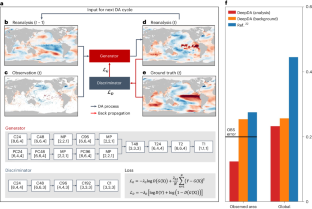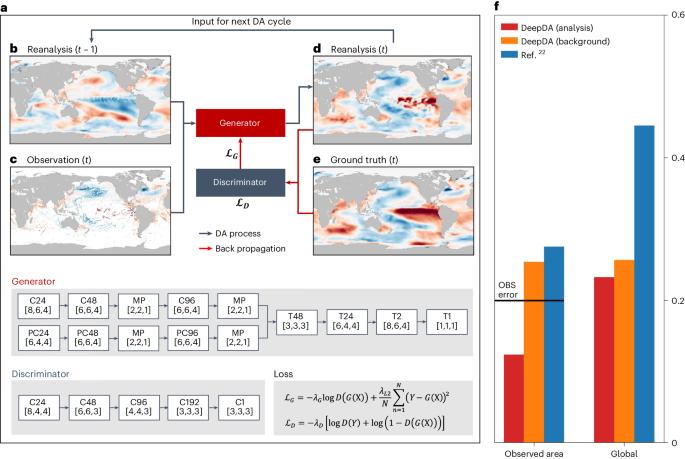Partial-convolution-implemented generative adversarial network for global oceanic data assimilation
IF 18.8
1区 计算机科学
Q1 COMPUTER SCIENCE, ARTIFICIAL INTELLIGENCE
引用次数: 0
Abstract
The oceanic data assimilation (DA) system has been developed to optimally combine numerical-model predictions with actual measurements from the ocean to create the best estimates of current ocean conditions and their uncertainties, improving our ability to forecast and understand the global climate variations. We developed DeepDA, a global oceanic DA system using deep learning, by integrating a partial convolutional neural network and a generative adversarial network. Partial convolution serves as an observation operator, mapping irregular observational data onto gridded fields, while generative adversarial network incorporates observational information from previous time frames. Our observing system simulation experiments, using simulated observations for the DA, revealed that DeepDA markedly reduces analysis error of the oceanic temperature, outperforming both background and observed values. DeepDA’s real-case global temperature reanalysis spanning from 1981 to 2020 accurately reconstructs observed global climatological temperature fields, along with their seasonal cycles, major oceanic temperature variabilities and global warming trend. Developed solely with a long-term control simulation, DeepDA lowers technical hurdles in creating global ocean reanalysis datasets using multiple numerical models’ physical constraints, thereby diminishing systematic uncertainties in estimating global oceanic states over decades with these models. Data assimilation (DA) techniques are commonly used to assess global Earth system variability but require considerable computational resources and struggle to handle sparse observational data. Ham and colleagues introduce a partial convolution and generative adversarial network-based global oceanic DA system and successfully reconstruct the observed global temperature in a real case study with smaller computational costs than traditional DA systems.


用于全球海洋数据同化的部分卷积生成对抗网络
开发海洋数据同化(DA)系统的目的是将数值模式预测与海洋实际测量结果进行优化组合,从而对当前海洋状况及其不确定性做出最佳估计,从而提高我们预测和了解全球气候变异的能力。我们通过整合部分卷积神经网络和生成对抗网络,开发了使用深度学习的全球海洋数据分析系统 DeepDA。部分卷积作为观测算子,将不规则的观测数据映射到网格场上,而生成对抗网络则结合了之前时间段的观测信息。我们利用模拟观测数据进行了观测系统模拟实验,结果表明,DeepDA 显著降低了海洋温度的分析误差,优于背景值和观测值。DeepDA的实况全球温度再分析从1981年一直持续到2020年,准确地重建了观测到的全球气候学温度场及其季节周期、主要海洋温度变率和全球变暖趋势。DeepDA 完全是通过长期控制模拟开发的,它降低了利用多种数值模式物理约束条件创建全球海洋再分析数据集的技术障碍,从而减少了利用这些模式估计几十年全球海洋状态的系统不确定性。
本文章由计算机程序翻译,如有差异,请以英文原文为准。
求助全文
约1分钟内获得全文
求助全文
来源期刊

Nature Machine Intelligence
Multiple-
CiteScore
36.90
自引率
2.10%
发文量
127
期刊介绍:
Nature Machine Intelligence is a distinguished publication that presents original research and reviews on various topics in machine learning, robotics, and AI. Our focus extends beyond these fields, exploring their profound impact on other scientific disciplines, as well as societal and industrial aspects. We recognize limitless possibilities wherein machine intelligence can augment human capabilities and knowledge in domains like scientific exploration, healthcare, medical diagnostics, and the creation of safe and sustainable cities, transportation, and agriculture. Simultaneously, we acknowledge the emergence of ethical, social, and legal concerns due to the rapid pace of advancements.
To foster interdisciplinary discussions on these far-reaching implications, Nature Machine Intelligence serves as a platform for dialogue facilitated through Comments, News Features, News & Views articles, and Correspondence. Our goal is to encourage a comprehensive examination of these subjects.
Similar to all Nature-branded journals, Nature Machine Intelligence operates under the guidance of a team of skilled editors. We adhere to a fair and rigorous peer-review process, ensuring high standards of copy-editing and production, swift publication, and editorial independence.
 求助内容:
求助内容: 应助结果提醒方式:
应助结果提醒方式:


